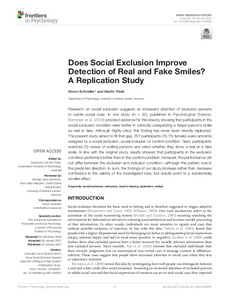| dc.date.accessioned | 2021-03-05T12:59:56Z | |
| dc.date.available | 2021-03-05T12:59:56Z | |
| dc.date.issued | 2021-01-28 | |
| dc.identifier | doi:10.17170/kobra-202103053427 | |
| dc.identifier.uri | http://hdl.handle.net/123456789/12587 | |
| dc.description.sponsorship | Gefördert durch den Publikationsfonds der Universität Kassel | |
| dc.language.iso | eng | |
| dc.rights | Namensnennung 4.0 International | * |
| dc.rights.uri | http://creativecommons.org/licenses/by/4.0/ | * |
| dc.subject | social exclusion | eng |
| dc.subject | ostracism | eng |
| dc.subject | need to belong | eng |
| dc.subject | replication | eng |
| dc.subject | smiles | eng |
| dc.subject.ddc | 150 | |
| dc.title | Does social exclusion improve detection of real and fake smiles? A replication study | eng |
| dc.type | Aufsatz | |
| dcterms.abstract | Research on social exclusion suggests an increased attention of excluded persons to subtle social cues. In one study (N = 32), published in Psychological Science,Bernstein et al. (2008) provided evidence for this idea by showing that participants in the social exclusion condition were better in correctly categorizing a target person’s smile as real or fake. Although highly cited, this finding has never been directly replicated.
The present study aimed to fill that gap. 201 participants (79.1% female) were randomly assigned to a social exclusion, social inclusion or control condition. Next, participants watched 20 videos of smiling persons and rated whether they show a real or a fake smile. In line with the original study, results showed that participants in the exclusion condition performed better than in the control condition. However, the performance did not differ between the exclusion and inclusion condition—although the pattern was in the predicted direction. In sum, the findings of our study increase rather than decrease confidence in the validity of the investigated idea, but results point to a substantially smaller effect. | eng |
| dcterms.accessRights | open access | |
| dcterms.creator | Schindler, Simon | |
| dcterms.creator | Trede, Martin | |
| dcterms.extent | 6 Seiten | |
| dc.relation.doi | doi:10.3389/fpsyg.2021.626087 | |
| dc.subject.swd | Ausgrenzung | ger |
| dc.subject.swd | Soziale Ächtung | ger |
| dc.subject.swd | Lächeln | ger |
| dc.type.version | publishedVersion | |
| dcterms.source.identifier | EISSN 1664-1078 | |
| dcterms.source.journal | Frontiers in psychology | eng |
| dcterms.source.volume | Volume 12 | |
| kup.iskup | false | |
| dcterms.source.articlenumber | Article 626087 | |


